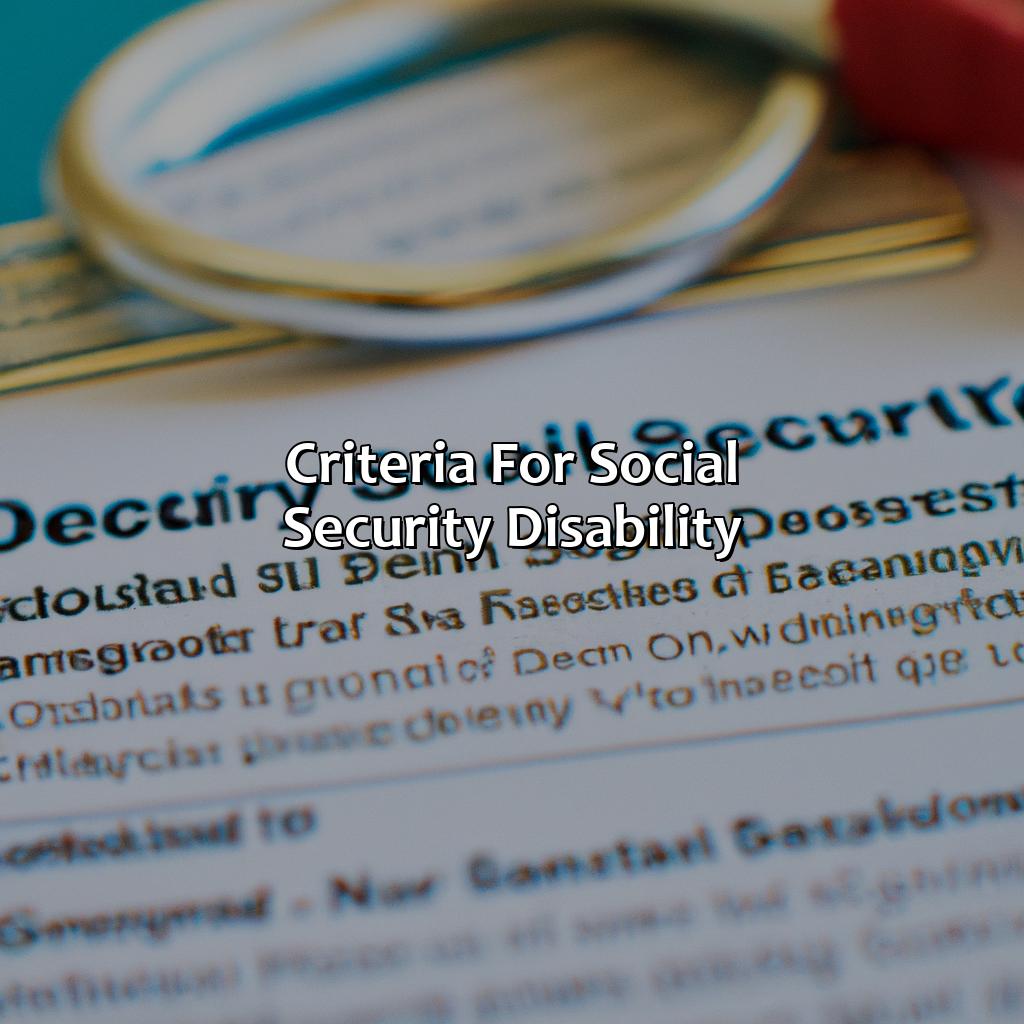What Are The Criteria For Social Security Disability?
Key Takeaway:
- Social Security Disability depends on meeting specific criteria: In order to qualify for Social Security Disability, individuals must meet certain criteria related to their medical condition, work history, the severity of their disability, the duration of their disability, and their age.
- Medical eligibility is a crucial component: One of the main factors determining Social Security Disability eligibility is the presence of a physical or mental medical condition that is either terminal or expected to last at least one year. Documentation from a medical professional is often required as proof of this condition.
- Filing for Social Security Disability can be a complex process: The application process for Social Security Disability can be detailed and involve several steps. Required documentation may include medical records, employment history, and personal information. It’s important to understand the process and criteria before applying.
Are you looking for information about Social Security Disability? You’re in the right place. This article will help you understand the criteria for eligibility and give you the resources to make an informed decision. Learn more about navigating the Social Security Disability process today!
Criteria for Social Security Disability
To qualify for Social Security Disability, you must meet certain requirements. We’ll discuss the medical and work qualifications needed to be met. Moreover, we’ll cover disability severity, how long it lasts, and age limits in this article.

Image credits: retiregenz.com by Yuval Woodhock
Medical Eligibility
Determining Eligibility for Social Security Disability Benefits based on medical conditions requires meeting the stringent criteria set by the Social Security Administration (SSA). The individual must have a debilitating medical condition impairing their ability to work and earn substantial income.
The SSA uses a five-step sequential evaluation process to determine if an applicant qualifies for Social Security disability benefits. The evaluation considers whether the applicant is working and earning above their substantial gainful activity (SGA) level, if their condition impairs their ability to perform basic work-related activities, whether their condition meets or equals one of the listed medical impairments, assessing their residual functional capacity (RFC), and finally considering whether there are any other types of relevant work available at different exertional levels.
Medical Eligibility evaluation requires substantial evidence documenting any physical restrictions that affect the ability to perform daily activities, limitations due to mental or emotional distress affecting meaningful regular activities. Use all significant medical records, include treatment notes, imaging results, lab tests, and other relevant information. The evidence must show how your condition affects your abilities in performing ordinary work.
Additionally, it is essential to have clear communication with your doctor explaining your exact limitations and issues caused by the illness. This enables them to create detailed records describing how your condition poses severe restrictions on functional abilities that would make it impossible to do job-related duties safely.
Applicants may also benefit from hiring an attorney or an accredited representation specialist who helps ensure that every step of the application process adheres to SSA regulations correctly. They work closely with healthcare professionals and understand constitutional law as well as research adequate support sources mitigating claim validation challenges.
Looks like the only job you’re eligible for is writing one-liners about disability criteria.
Work Eligibility
To be considered for Social Security Disability benefits, one must meet certain eligibility requirements in regards to their work history. Individuals must have worked a sufficient amount of time and paid into the Social Security system through payroll taxes. Additionally, their medical condition must be severe enough to prevent them from engaging in substantial gainful activity (SGA).
Meeting the criteria for work eligibility is crucial in determining eligibility for Social Security Disability benefits. Individuals must have earned sufficient credits through paying into the system, generally equivalent to 10 years of work. Their medical condition must also have lasted or be expected to last at least one year, or result in death.
It’s important to note that even if an individual meets these criteria, it does not automatically guarantee approval for disability benefits. The severity of their medical condition, age, education level, and transferable skills are also taken into consideration.
If someone believes they meet the work eligibility criteria for Social Security Disability benefits but have been denied, they can seek help from an attorney who specializes in disability law. An attorney can assist with gathering necessary evidence and presenting a strong case to the Social Security Administration.
Being disabled is one thing, but being severely disabled is like playing life on expert mode.
Disability Severity
When evaluating eligibility for Social Security Disability benefits, Disability Severity is a critical factor. The Socio-Occupational functioning of the individual is assessed during the review process. Functional limitations caused by mental, physical, or emotional conditions are analyzed to determine the severity of the disability. Medical evidence in this regard, including medical reports and clinical assessments, is crucial.
The adjudicators consider several sources of evidence while evaluating claims for Disability Severity. They look at physician statements, medical records from hospitals and clinics as well as past occupations, transferable skills and abilities and employment prospects to analyze the claimant’s situation thoroughly.
In determining Disability Severity level, functionality levels play a crucial role in determining eligibility. Applying for benefits below a severe functional impairment level will not be successful. Generally, those individuals who have limited ability to concentrate or remember tasks, complete activities required on time or organize tasks may qualify to receive assistance from Social Security.
It can be suggested that when going through an evaluation of the disability severity level while applying for Social Security benefits to bring along supporting documentation covering all aspects of mental and physical health status including counseling records or therapy logs if available. Providing accurate functional work history can also strengthen claims for both physical and mental impairments when applying for such benefits.
Disability can be like a never-ending vacation, but instead of sipping margaritas on the beach, you’re stuck at home with Netflix and painkillers.
Duration of Disability
The time span for which an individual is unable to work due to a physical or mental condition is crucial in determining the eligibility for social security disability benefits. The length of time and severity of the condition must meet specific criteria to qualify.
Individuals who have a total disability that has persisted for at least 12 consecutive months, or is expected to last as such, are eligible for social security disability benefits. It is essential to note that this rule does not apply to individuals with terminal illnesses.
Once an individual meets the duration requirement, the social security administration evaluates their residual functional capacity (RFC). It outlines how much an individual can do despite their medical conditions and whether they can perform any job that exists in the economy. This evaluation helps determine if an individual qualifies for benefits and what amount they are eligible for.
An individual’s RFC could change over time; thus, continuous monitoring is necessary. Individuals should ensure timely communication with doctors and other healthcare providers for accurate documentation and follow-up care. This may help demonstrate that their condition remains severe enough to continue receiving benefits.
Just because you’re getting old doesn’t mean you’re automatically disabled – unless you’re trying to use a smartphone without reading glasses.
Age Limit
One of the parameters for qualifying for Social Security Disability is Age Eligibility. The age limit is set at 65 years or older, just like the retirement age to receive full benefits. However, younger workers with significant disabilities also qualify for SSDI (Social Security Disability Insurance) if they meet the other criteria.
Additionally, some exemptions to this age rule apply to disabled widows or widowers aged 50-60 years along with their disabled children; they may qualify for survivor’s disability benefits. This program seeks to provide support to individuals and families affected by disabling conditions that impact their ability to work and earn a living.
A true story of someone who experienced the impact of this age limit criterion could be about a woman named Jane. She had severe arthritis that made it challenging to do her job as a nurse and was unable to work after her early 50s due to worsening health concerns. She initially found it challenging when she realized she could not achieve retirement benefits since she was still in her fifties. Nevertheless, with guidance from an attorney specializing in SSDI law, she learned about the disability programs available, applied, and successfully received benefits assisting in managing her health condition financially while improving access to medical care.
Applying for Social Security Disability? Good luck, you’ll need it more than a four-leaf clover in a field of rabbits.
Applying for Social Security Disability
Apply for Social Security Disability with ease! Have all the Required Documents. Learn about The Application Process. Submit your application and medical records. If your claim gets rejected, you have the option of Appealing. Denied Claim? No worries!

Image credits: retiregenz.com by Yuval Arnold
Required Documents
When submitting a claim for Social Security Disability, there are specific documents that need to be provided. These documents can vary based on specific situations and conditions.
- Medical Records: This includes any medical documentation pertaining to the disability, treatments received, and how it affects the individual’s ability to work.
- Work History: A complete work history including past jobs and job descriptions will need to be submitted.
- Tax Returns: Previous tax returns will need to be provided as proof of income.
It’s important to keep in mind that additional documents may also be required depending on the nature of the claim.
When applying for Social Security Disability benefits, providing accurate and up-to-date information is crucial for a successful application process.
A source from the official website of the Social Security Administration confirms that an applicant must provide “Detailed information about their medical condition(s)” when filing a disability claim.
Applying for social security disability is like playing a game of ‘Red Light, Green Light‘ with the government – except instead of stopping when the light turns red, they just keep moving the finish line.
The Application Process
The process of filing a Social Security Disability claim is intricate, and comprehension of the formal requirements needed is crucial. Here’s a guide to assist individuals in navigating through the submission steps:
- Application Submission – The submission can occur in person at the nearest Social Security office or via an online platform.
- Medical Records Availability – The Social Security Administration will collect medical records from an applicant’s doctor(s).
- Evaluation for Approval – An official from the Social Security Administration will assess all provided documentation to determine eligibility for social security disability.
Failure to provide thorough and comprehensive submissions may result in delays or rejection of an SSD claim. Ensure that documentation originates with qualified medical experts using relevant standard filing practices.
PRO TIP: Attend appointments with healthcare practitioners regularly to maintain accurate SSD files.
Looks like the Social Security Administration denied your claim faster than a cat can knock over a vase – time to appeal!
Appealing a Denied Claim
If your claim for disability benefits has been denied by the Social Security Administration (SSA), you have the right to appeal. The appeals process involves several steps and can be a lengthy and challenging journey, but it may result in the approval of your benefits.
To begin the appeals process, you must first file a Request for Reconsideration with SSA, which is a formal request for them to review your case again. If this does not result in an approval, you can then request a hearing before an Administrative Law Judge. If the judge denies your claim, you can ask for a review by the Appeals Council or file a lawsuit in federal court.
It’s important to note that many claims are initially denied but later approved during the appeals process. Hiring an experienced disability attorney can greatly increase your chances of success.
Fact: According to data from SSA, approximately 62% of initial disability claims were denied in 2020.
Five Facts About Criteria for Social Security Disability:
To qualify for Social Security Disability, you must have a medical condition that meets the Social Security Administration’s definition of disability. (Source: SSA)
The medical condition must be expected to last for at least a year or result in death. (Source: SSA)
You must have worked long enough and earned enough work credits to be eligible for Social Security Disability benefits. (Source: SSA)
The Social Security Administration uses a five-step evaluation process to determine eligibility for disability benefits. (Source: SSA)
If your application for disability benefits is denied, you have the right to appeal and request a hearing with an administrative law judge. (Source: SSA)
FAQs about What Are The Criteria For Social Security Disability?
What are the criteria for social security disability?
To qualify for social security disability benefits, you must meet two criteria:
- You must have a medical condition that is expected to last at least one year or result in death
- Your medical condition must prevent you from performing any substantial gainful activity (SGA)
What is meant by substantial gainful activity?
Substantial gainful activity (SGA) refers to any work that involves significant physical or mental effort and produces income above a certain level. For 2021, the monthly SGA amount for non-blind individuals is $1,310.
What types of medical conditions qualify for social security disability?
Any medical condition that meets the above criteria can qualify for social security disability, but some common examples include cancer, heart disease, respiratory disorders, musculoskeletal disorders, and mental disorders.
Do I have to wait a certain amount of time before I can apply for social security disability?
No, there is no waiting period to apply for social security disability benefits. However, your medical condition must have already lasted or be expected to last at least one year or result in death.
Is there an age limit for social security disability benefits?
No, there is no age limit to receive social security disability benefits.
How can I apply for social security disability?
You can apply for social security disability benefits online, by phone, or in person at your local Social Security office. You will need to provide detailed information about your medical condition, work history, and other personal information.
 Checkout this IRS Loophole
Checkout this IRS Loophole 
